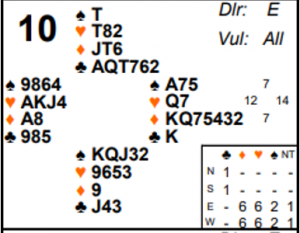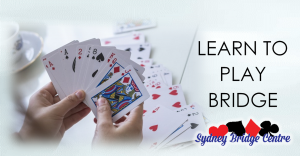City and Canada Bay – Monday Morning 9th September 2024.

On board 10 last week East West had a combined 26 points and could in fact make slam. But a lot of pairs played the hand in a part score. Let’s see what might have gone wrong.
East has a normal 1♦ opening. These days I suspect some players might actually venture a 1♠ overcall on the South hand! It certainly indicates the lead you want from partner and it takes up some space so it has a lot more going for it than you might at first suspect. But if does of course risk partner getting far too excited! Game all vulnerability also makes it less attractive. But at favourable vulnerability 1♠ is likely to show a big profit overall.
Assuming, however, that South passes then West will respond 1♥ (he has an easy negative double after 1♦ 1♠ anyway). After 1♦ P 1♥ North might consider wading in now with something like a 3♣ weak jump overcall but that’s also very risky vulnerable – especially when the opponents haven’t yet found a fit (see advanced section for more on that). Assuming again that North passes then East should make a jump rebid of 3♦ . It looks like some pairs played in 2♦ but the East hand is a lot too good for that. The 3♦ jump rebid usually shows at least 6 diamonds and a hand worth about 15-17 points. Despite the singleton ♣K (which may be worthless) this hand is still worth that. The ♥Q in partner’s suit may well be useful but the 7th diamond (and honours in the diamond suit) improve it more – there are good chances to set up the long suit and score lots of tricks. Another way to think about it is to consider what East might have had to bid 2♦ (a bad 11 points and 6 diamonds). Now compare that with what he actually does have! If you make the same bid on such widely different hands, it’s impossible for partner to judge accurately what to do.
It looks like quite a few West players must have passed 3♦ as several pairs played there. But the hand has a good 12 points opposite an opening bid – you want to be trying game of some sort as soon as partner opens. When partner shows a better than minimum hand you absolutely must be in at least game. The only question is which one?
Not holding a stopper in either black suit makes it hard for West. If he tries something like 3♠ that will imply that he had 5 hearts initially so could mislead partner. Raising diamonds is going past 3NT though. Playing in 5♦ at matchpoint pairs will score very badly if 3NT is making so you almost might as well try 6♦ ! There are no good answers. But just bidding 3NT is actually not a bad shot! See advanced section for why.
What about the play? In theory 3NT is wrong because the defenders can cash 6 clubs. In the real world, however, is North about to lead the ♣A? Highly unlikely unless he can see through the back of the cards. If he leads another suit then declarer has an easy 12 tricks. In fact if North tries a low club then the ♣K will score and declarer will make all 13!
Of course you really want to be playing the hand in 6♦ – there are 12 easy tricks there (the two spade losers in the East hand get discarded on West’s heart suit – so the only loser is a club). In fact you can also make 6♥ on a 4-2 fit! That’s because even on two rounds of clubs, declarer can ruff with ♥7, cash ♥Q, cross to ♦ A and draw trumps (which handily split 4-3). Anyone who bids that should be playing in the upcoming world championships!
A sequence to discuss with a regular partner is what 4♦ means over 1♦ -1♥-3♦ ? Firstly – is it forcing? Not everyone plays it that way although it’s much more practical to do so (trying to stop in 4 minor is like trying to land on a pinhead – you might as well try for 5 as you score a game bonus if it makes – some players take a similar view about not playing in 2NT). Secondly – some pairs might play 4♦ as “Minorwood” – i.e. asking for key cards in diamonds. That’s quite a popular convention although personally I am not a fan – see advanced section for more.
Here West might view that 6♦ could have chances if partner can control the black suits. Although it’s still pretty optimistic to go beyond game on the hand. The real problem is East’s jump to 3♦ takes up a lot of space in the auction. This may be a hand where a strong club system will work better than natural bidding. If East opens 1♣ (15+) then the pair has a lot more space to explore. Although then it’s more likely that North South will intervene to cause trouble!
Key points to note
- It is winning bridge in the long run to play any pair of hands containing at least 25 points in game. Yes there will be hands where no game can make but, on average, many more will make.
- Don’t just look at raw high card points (they are only an initial guide) – evaluate where your honours are and whether you have extra length in a suit. Also consider what you might have had to make a bid and compare your actual hand to that.
- It is a lot safer to compete in auctions where the opponents have shown a fit, than when they haven’t.
- Just because you don’t have a stopper doesn’t mean partner can’t. If he’s guaranteed to have some points in the suit then it can be a reasonable gamble to just try 3NT yourself.
More advanced
I mentioned that North bidding 3♣ after 1♦ P 1♥ would be very risky as the opponents haven’t yet found a fit. Let me elaborate a bit more. There’s a big difference between auctions when the opponents have found a fit and when they haven’t. Mathematically if one side has a 9 card fit then the other side will always have at least one 8 card fit (if they have 9 of a suit then your side only has 4, you have 26 cards between your two hands so that leaves 22 cards for the other 3 suits, the most even way they can divide is 7,7,8). Even when they have an 8 card fit there’s only one layout where your side doesn’t have its own 8 card fit (here you have 21 cards left for the other 3 suits so they could divide 7,7,7 but in any other division it means you’ll have at least one 8 card fit).
Why does that matter? Because it makes it safer to compete in the bidding after you know they have a fit. Auctions like 1♦ –1♥–2♦ or 1♦ -1♥-3♦ do not guarantee any fit. Contrast that to 1♦ -1♥-2♥.
So why is 3NT not such a bad effort from West after 1♦ –1♥–3♦ ? Yes you don’t have either black suit stopped but ask yourself what partner has? He has made a jump rebid which is usually at least 15 points. With his own good holdings in the red suits, West knows East can have at most 2 points in hearts (♥Q) and at most 6 in diamonds (♦ KQJ). Which means some of his points must be in the black suits and there’s a good chance those will provide stoppers. What’s more even if they don’t then North will might not lead the right suit! West’s ♦ Ax also means there is a good chance of being able to immediately run the diamond suit. Hence 3NT is a reasonable gamble.
Minorwood is played quite commonly and usually applies to a bid of 4 of the agreed minor. The logic of course being that 4NT is often too high to begin blackwood in a minor suit as the response will frequently force you to 6 of your minor anyway. By starting at the 4m level you have more room available.
That’s true but I still personally hate minorwood as a convention though!
I dislike it for two reasons:
- I can never find anyone who can provide a clear set of rules for exactly when 4 minor is minorwood and when it means something else! Does it apply in competition? Over pre-empts? Only when the suit has been explicitly agreed the previous round (e.g. 1♥–2♦ –3♦ –4♦ but not 1♦ –1♥–3♦ –4♦ ?) There are so many variations and I have seen many disagreements over whether 4 minor should or should not be minorwood!
- So often you want 4 of a minor to be the bid that agrees that suit as trumps and then partner can decide if they want to use blackwood or if they think cue bidding is better on the hand. Asking for key cards is a pretty blunt instrument – it’s really only useful for checking if you happen to be missing too many key cards to play slam. You only tend to want to do that after you have concluded you probably have a route to 12 tricks and don’t have 2 quick losers in a suit.
Julian Foster (many times NSW representative)




